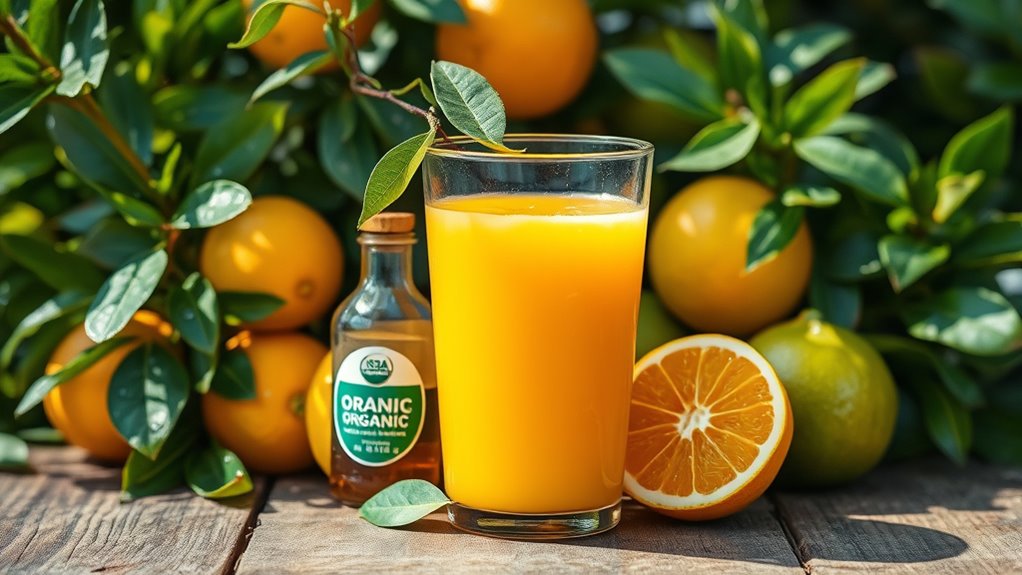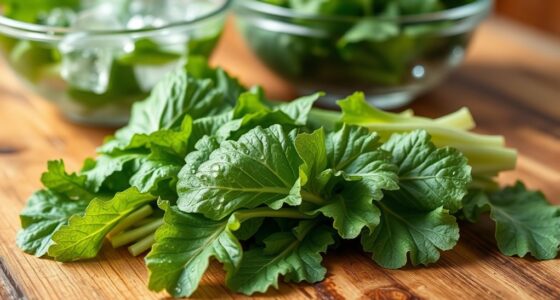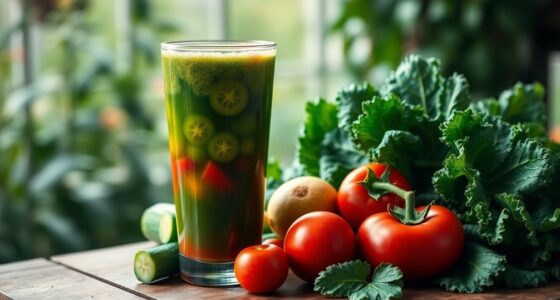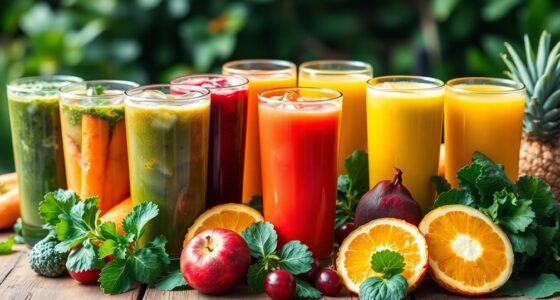When you see “USDA Organic” on juice, it means the product meets strict standards for organic farming. No synthetic fertilizers, pesticides, or GMOs are permitted, and the juice must be made through environmentally friendly practices that prioritize soil health and sustainability. The certification also guarantees the juice has been thoroughly inspected from farm to bottle, maintaining quality and safety. Keep exploring to understand how this certification impacts what you’re drinking.
Key Takeaways
- USDA Organic certification ensures juice is made from fruits grown without synthetic fertilizers or genetically modified organisms.
- It guarantees that natural or approved non-synthetic pesticides are used, minimizing chemical residues.
- Organic juice must be processed without synthetic additives, preservatives, or artificial flavors.
- Certification involves thorough inspections and record-keeping to verify adherence from farm to packaging.
- The label emphasizes environmental sustainability, soil health, and safe, eco-friendly farming practices.
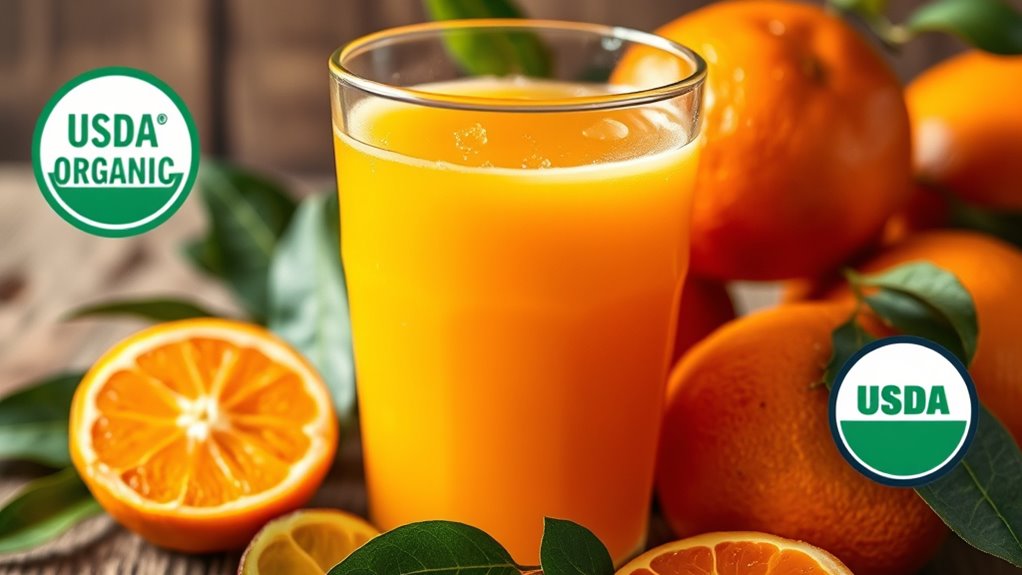
Have you ever wondered what “USDA Organic” really means when it comes to juice? When you see that label on a bottle, it signifies more than just a marketing statement—it indicates that the juice meets strict standards set by the United States Department of Agriculture. At its core, USDA Organic certification guarantees that the product has undergone a rigorous review process, ensuring it adheres to specific agricultural practices that prioritize environmental health and consumer safety. For juice, this means the fruits used must be grown without synthetic fertilizers or genetically modified organisms, which aligns with the core principles of organic farming.
One of the key aspects of USDA Organic certification is compliance with pesticide standards. You might wonder if organic means no pesticides at all. Not exactly. Organic farming doesn’t ban all pesticide use but restricts synthetic chemicals. Instead, farmers are allowed to use natural or non-synthetic pesticides that are approved by the USDA. These are typically derived from natural sources and are subject to strict limits on application and residue levels. This focus on pesticide standards aims to minimize chemical residues in your juice, providing you with a product that’s safer for your health and better for the environment. It’s about reducing your exposure to potentially harmful chemicals while supporting farming practices that are more sustainable.
Getting USDA Organic certification isn’t a simple process. Farmers and juice producers must undergo thorough inspections and keep detailed records to verify that their practices meet organic standards consistently. This process ensures that every step, from planting to harvesting and processing, aligns with organic protocols. When it comes to juice, this means that the fruits are harvested from certified organic farms, and the processing methods avoid synthetic additives, preservatives, or artificial flavors. It also ensures that during packaging and transportation, the product remains free from contamination with non-organic substances. Additionally, the certification process emphasizes the importance of soil health and sustainable farming techniques to maintain the integrity of the organic label.
Frequently Asked Questions
Does USDA Organic Guarantee Pesticide-Free Juice?
No, USDA Organic doesn’t guarantee pesticide-free juice, but it does mean the juice has minimal pesticide residue. Organic farming practices restrict synthetic pesticides, so the chances of pesticide residues are lower. However, some natural pesticides are allowed, and contamination can still occur through environmental factors. So, while organic juice reduces your exposure to synthetic pesticides, it doesn’t guarantee completely pesticide-free juice.
Are All Organic Juices Free From Added Sugars?
Not all organic juices are free from added sugars. Organic farming standards allow natural sweeteners and limited juice additives, but some brands might include organic cane sugar or fruit concentrates. Always check labels to see if added sugars are present. Choosing certified organic juice helps guarantee minimal use of synthetic pesticides and additives, but it doesn’t automatically mean it’s sugar-free. Reading ingredient lists helps you make the best choice.
How Does Organic Certification Affect Juice Shelf Life?
Organic certification doesn’t necessarily extend juice shelf life, but it influences preservation methods. You might notice organic juices often use less artificial preservatives, relying on proper pasteurization and aseptic processing for shelf stability. While these methods ensure safety, they can limit shelf life compared to conventionally preserved juices. So, with organic juice, fresh taste and quality take precedence, but you’ll want to consume it sooner to enjoy ideal freshness.
Can Organic Juice Be Gmo-Free?
Yes, organic juice can be GMO-free. Organic standards strictly prohibit the presence of GMO ingredients, ensuring that your juice contains no genetically modified organisms. When you choose USDA Organic, you’re supporting products that adhere to these strict guidelines, giving you peace of mind that the juice is free from GMO presence and produced without synthetic chemicals or artificial additives. This commitment promotes natural, wholesome options for your health.
Is Organic Certification Consistent Worldwide for Juice Products?
You’ll find that organic certification isn’t perfectly consistent worldwide; it’s like trying to keep a wild animal tame. International standards aim to create harmony, but certification variances still exist between countries. Some regions may have stricter or laxer rules, making it tricky to compare organic juice brands globally. Always verify the certifying agency’s credentials to guarantee you’re getting truly organic juice, no matter where you buy it.
Conclusion
So, now that you know what ‘USDA Organic’ means for juice, you can confidently choose products that align with your values. Remember, this label guarantees you’re getting juice made without synthetic pesticides or GMOs—kind of like having a trusty compass in a sea of choices. Just like your favorite vintage record, organic juice offers authenticity and quality you can trust. So, go ahead, sip with confidence, and enjoy the genuine taste of nature’s best!

